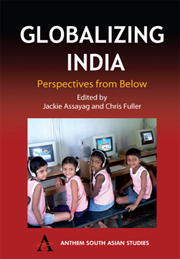Book contents
- Frontmatter
- Contents
- List of Contributors
- Acknowledgements
- 1 Introduction
- Part One Economy and Agriculture
- Part Two Education and Language
- 6 ‘Children are Capital, Grandchildren are Interest’: Changing Educational Strategies and Parenting in Calcutta's Middle-class Families
- 7 Of Languages, Passions and Interests: Education, Regionalism and Globalization in Maharashtra, 1800–2000
- Part Three Culture and Religion
- Bibliography
6 - ‘Children are Capital, Grandchildren are Interest’: Changing Educational Strategies and Parenting in Calcutta's Middle-class Families
from Part Two - Education and Language
Published online by Cambridge University Press: 05 March 2012
- Frontmatter
- Contents
- List of Contributors
- Acknowledgements
- 1 Introduction
- Part One Economy and Agriculture
- Part Two Education and Language
- 6 ‘Children are Capital, Grandchildren are Interest’: Changing Educational Strategies and Parenting in Calcutta's Middle-class Families
- 7 Of Languages, Passions and Interests: Education, Regionalism and Globalization in Maharashtra, 1800–2000
- Part Three Culture and Religion
- Bibliography
Summary
This chapter examines the relationship between gender and globalization. It highlights the way in which education and aspirations for upward mobility, brought about by changing labour markets, have altered understandings of parenting and the division of work among women belonging to middle-class households in two Calcutta neighbourhoods.
Changes related to new forms of employment have influenced formal education in Calcutta and in turn modified the way middle-class women are involved in the daily work of raising children and running a household at different stages. Although mothers have contributed to schooling for generations, the emphasis on employment in multinational companies has brought about a shift in educational strategies towards private English-language education. This is increasingly seen as a precondition for occupational choices offered in the ‘global’ market, which demands the reorganization of parenting practices and the division of labour in the household.
When globalization is discussed with reference to the middle-class family or the ‘domestic sphere’, the politics of economic liberalization are held responsible for the widespread emergence of specific types of domestic organization in the context of consumerism and urbanisation among the new middle classes (Jamieson 1998; Giddens 1999). It is assumed that specific notions regarding the separation of a private and a public sphere, the nuclearisation of households, marital relations, and child-rearing practices are adopted in the process. The macro-politics of markets are held responsible for a more homogeneous pattern of household organization worldwide.
- Type
- Chapter
- Information
- Globalizing IndiaPerspectives from Below, pp. 119 - 140Publisher: Anthem PressPrint publication year: 2005
- 12
- Cited by



